
In 2009, the MLB’s Most Valuable Player was won by Joe Mauer. Behind him were Mark Teixeira, Derek Jeter, Miguel Cabrera and Kendrys Morales. While four of the top-five vote getters that season are playing and doing quite well, Morales finds himself on the unemployment line. Why is he still unemplyed entering the second month of the season?
Where’s Kendrys Morales? He must be too old, right? Morales turns 31 in two months, so that is not the answer.
He must not be able to play anymore, right? Last year, Morales hit .277 with 23 home runs and 80 runs batted for the Seattle Mariners.
Since becoming a full-time player in the major leagues, Morales has hit 90 home runs, driven in 300 runs, and has 528 hits in 1,845 at-bats for a stellar .286 batting average. All this has come in 493 games.
Based on the above pace, where an average season yields around 600 at-bats, here are Kendrys Morales’ numbers.
.286 batting average with 30 home runs and 100 runs batted in. That sounds great, right?
If he had been healthy last season and gotten 600 at-bats, Morales would have been one of five players to repeat that line of .286 30 home runs and 100 runs batted in. The other four were Miguel Cabrera, Chris Davis, Paul Goldschmidt and David Ortiz.
That is great company to be in…but there’s a question that needs to be answered.
Why is Kendrys Morales unemployed?
CBS’ Jon Heyman says “executives and others around baseball” think that Morales could sign after the draft in June. Why? If he signs with another team, it would forfeit a first-round draft pick because of MLB’s compensatory rules.
Scott Boras, who is Morales’ agent, says that this rule is “ruining” the integrity of the game.”
In that very same article on Fox Sports, Morosi explains the situation best:
This is the second full offseason of the current CBA, which expires after the 2016 season. And this is the second consecutive offseason Boras has had big-name free agents remain unsigned beyond Feb. 1. Last year, it was Michael Bourn and Kyle Lohse. This time, it’s Stephen Drew and Kendrys Morales.
In each of those cases, the Boras clients rejected one-year qualifying offers: $13.3 million in 2013, $14.1 million this year. That meant teams would need to surrender a draft pick — and, equally important, the signing bonus allotment tied to that pick — in order to sign those free agents.
General managers today are reluctant to part with first- and second-round draft picks, because of the industry-wide emphasis on building from within. That sentiment is compounded by CBA restrictions against overspending in later rounds. (Before, teams offset the loss of high picks by buying out high school stars from their college commitments with “above-slot” bonuses.)

Scott Boras. Photo by David Manning, USA Today Sports Images
Morosi “hit the nail on the head,” per se, because that could be exactly why Morales is still unemployed. While Boras and his clients do not want to sign one-year deals, (who can fault them) it may have been a better thing for the player, and for the team that the player signs with. The bottom line is that these players want to play baseball, and are currently unemployed despite being readily available, and more talented, than some players currently starting in the big leagues.
In Kendrys Morales’ situation, everyone wants to point the finger at Scott Boras, but in reality the rule should be the one being condemned.
In this case, Scott Boras is right. He says “This system is not good for the teams or the players.”
These players (like Morales) should not be punished for having their name tied to a draft pick. It’s not their fault that they were able to perform well, and are being punished because teams do not want to sign the player and essentially trade a draft pick away for that same player.
How can it be fixed? The National Football League uses a system where an extra pick is awarded in compensation, similar to baseball’s “Type B” draft picks at the end of the first round.
In this system, if a player signs with another team, whichever team lost the player is compensated with a draft pick. This is not the same as the system in baseball, because in baseball the signing team loses their first-round pick. As a team, you basically have to sign the player and trade your first-round pick for him, which as Boras said, is not fair to the players.
If MLB were to adopt this system in the next CBA, these problems would be avoided, and players like Kendrys Morales would be playing tonight.
Morales is a free agent to no one’s fault except for the system in baseball. He is being punished because he is a good baseball player, but not good enough to be worth losing a first-round pick for.
How is that fair?
Photo by Rick Osentoski, USA Today Sports Images